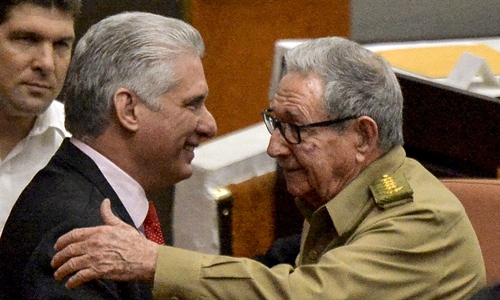US, Cuba trade terrorism accusations
Source:AFP Published: 2020/5/14 17:38:41
Trump’s rabid Havana haters unleashed for diplomatic menacing

Cuban First Secretary of the Communist Party Raul Castro (right) greets Cuban President Miguel Diaz Canel during the closing of the Fourth Regular Session of the National Assembly of People's Power in its Ninth Legislature at the Havana Convention Center on Saturday. The National Assembly of Cuba appointed architect Manuel Marrero prime minister on Saturday, the state press reported. Photo: AFP
The US and Cuba traded accusations of support for terrorism as US President Donald Trump's administration on Wednesday blacklisted the island, saying it had not fully cooperated on counter-terrorism.
Washington increased the pressure on Havana just one day after Cuba urged a terrorism probe over gunfire that hit its embassy in the US capital.
The State Department faulted Cuba over the presence of Colombia's leftist National Liberation Army (ELN) rebels, who traveled to Havana in 2017 to negotiate with the Bogota government but have not returned.
It was the first time that Cuba was not certified since the 2015 report. It joined the ranks of four other US adversaries - Iran, North Korea, Syria and Venezuela.
"Cuba's refusal to productively engage with the Colombian government demonstrates that it is not cooperating with US work to support Colombia's efforts to secure a just and lasting peace, security and opportunity for its people," the State Department said.
Colombian President Ivan Duque, a conservative ally of the US, broke off talks with the ELN after a January car bomb attack on a Bogota police academy killed 21 recruits.
The militants have been demanding, unsuccessfully, that Colombia grant safe passage for its negotiators to come back from Cuba.
The State Department certification falls under the Arms Export Control Act and will have little practical effect on Cuba, which does not buy weapons from its long-time foe.
But the step is the latest by Trump to increase pressure on Cuba and move away from the reconciliation efforts undertaken by Barack Obama.
The move is separate from a US designation of state sponsorship of terrorism, which has far-reaching legal effects.
The Obama administration removed Cuba from the list of state sponsors of terrorism in 2015, although Trump's State Department has flirted with putting it back on.
The ELN is said to operate in about 10 percent of Colombia but is a smaller player than the Revolutionary Armed Forces of Colombia, or FARC, which reached a landmark peace agreement with the government in 2016.
Miguel Ceballos, Colombia's high commissioner for peace, said the US move on Cuba gave weight to Bogota's demands "that all countries where ELN or FARC members are present hand them over to justice."
Cuban Foreign Minister Bruno Rodriguez accused the United States of hypocrisy for criticizing the island on terrorism but not preventing the attack on its embassy.
"It is hiding its history of state terrorism against Cuba and the impunity of violent groups on its territory," Rodriguez wrote on Twitter.
AFP
Posted in: AMERICAS,WORLD FOCUS,EYE ON WORLD